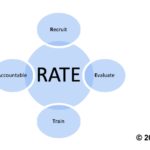 Our job as New Home Sales Managers, and as head coaches of our franchise team, is to Evaluate, Recruit, Train, and keep your team Accountable on an ongoing basis. All of these activities are interlinked and should be occurring simultaneously. Sadly, we just can’t afford to relax and accept the status quo, meaning we can’t only focus on one of these areas and forget the rest.
Our job as New Home Sales Managers, and as head coaches of our franchise team, is to Evaluate, Recruit, Train, and keep your team Accountable on an ongoing basis. All of these activities are interlinked and should be occurring simultaneously. Sadly, we just can’t afford to relax and accept the status quo, meaning we can’t only focus on one of these areas and forget the rest.
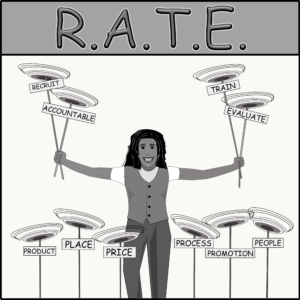 The best metaphor for this concept is a plate spinner, trying to keep all four plates spinning at the same time. One should always be engaged in all four of these activities. This will allow you to not only develop a championship level sales team, but also sustain consistent sales success.
The best metaphor for this concept is a plate spinner, trying to keep all four plates spinning at the same time. One should always be engaged in all four of these activities. This will allow you to not only develop a championship level sales team, but also sustain consistent sales success.
I created RATE as a simple acronym to help remind us of our management responsibilities and activities. However, as managers, we may not always follow the steps in this exact lineal order. Concentric circles sum it up perfectly, as these endeavors are constantly overlapping. Based upon my experience, both with my own sales teams and helping builders all across the country, it makes more sense for me to start with Evaluation as the first step to understanding RATE.
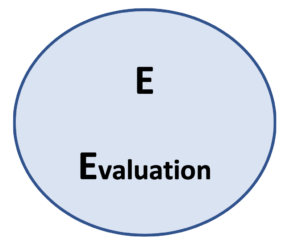
In his book, Basic Marketing (published in 1960), E. Jerome McCarthy is credited with creating the 7 P’s Marketing Mix. Here is his original formula:

Incredibly, this simple way of looking at our sales and marketing team is still as applicable today as it was way back then. As thoroughly engaged managers, everything we do should be managing all of our relevant P’s on a daily basis. If some of the P’s aren’t working effectively, or even worse are ignored, who will pay the price?
Exactly, we will be missing out on sales and eventually will receive the blame for lack of sales. Conversely, our goal should always be to create a “well-oiled sales and marketing machine”, so that we can create consistent success that is replicable. During the webinar, we will review all of the P’s, but for this blog, let’s just focus on the P for our own Sales People.
Typically, a manager only measures a salesperson’s efficacy based upon their sales results. However, there are essentially six ways that a new home sales manager can evaluate the strength of a salesperson, their ability to implement a replicable process that will cause long term success for their builder, and whether they are an asset to the team and a good fit with your company’s corporate culture:
GENERAL INTER COMPANY COMMUNICATION
OBSERVE WITH CLIENTS “MANAGEMENT BY WALKING ABOUT” or “MWBA” (Sam Walton)
VIDEO SHOP REVIEW
SALES RESULTS
CONVERSION RATIOS
A SALES PERSON MAP
Every month evaluate each sales person and make sure that they are contributing fully to your team. Ideally a complete franchise player will not only provide consistent sales success, but also be internally motivated with a winning attitude.
M = Motivated - Manageable
A = Attitude - Aptitude
P = Process - Persistence
Place your sales people in one of the four boxes below.
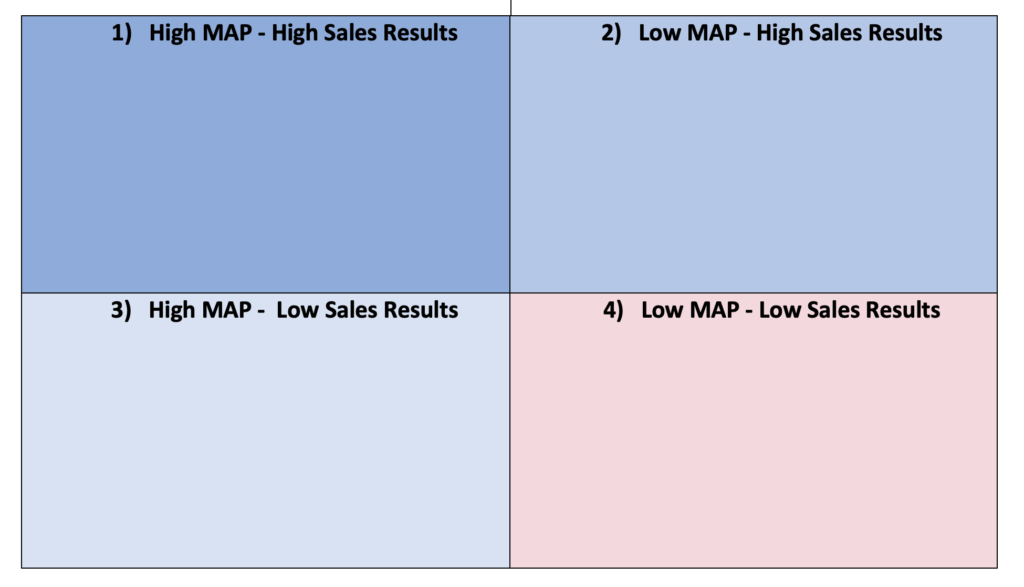
If placed in:
Box 1: Keep, motivate and reward.
Box 2: Keep, help improve the area within MAP they need to work on.
Box 3: Keep, help with specific sales skills.
Box 4: Replace.
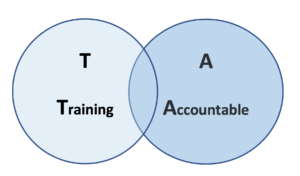
Logically, Training and Accountability go hand in hand. Whether you invest in an outside trainer like me, handle training by yourself, or a little of both, keeping the team accountable to the training is essential.
In fairness, there are two types of training programs. The first, treated by some like more of an event, is where the trainer comes in for a day and provides entertainment wrapped around some training ideas and concepts. Almost like a Cirque de Soleil with some metaphorical lessons entwined. The other, typically taken a bit more seriously, is attended by the whole executive team and is often considered the turning point in the transformation of both the salesperson and the company.
Please don’t get me wrong, I try to keep my training fun and interactive, but I certainly favor lineal training, whereby salespeople of every level learn processes and systems proven to work, that creates both transactional sales successes, as well as progressive development of their communicating, connecting, and sales skills.
With this in mind, we as sales managers need to commit to be the company’s chief coach and ensure that we love our salespeople enough by following up with them and providing them strategic coaching and training in the areas where they need to develop. I take great delight in being able to help salespeople at every level, from Essential to Advanced and Mastery.
So, with your Coaching Accountability Program (CAP), we have to remember that “Training is not one size fits all”, and we have to be flexible with how we approach the ongoing training. So, another A, after Accountable, would also be Adaptability. As with all connection, we have to ensure that we are flexible and adapt our teaching style and methods to create the greatest connection with our salespeople.
In order to keep training our team, to help keep them accountable and eventually evaluate their participation and progress in your teams’ success, we have to meet with them regularly. There are two essential meetings and a third that some managers utilize.
This is the time that you should really get to know your sales person, and work on strategic areas they need, as well as transactional items, such as hot prospects and sales pipeline issues.
The manager should meet with the sales person in their own sales environment to discuss their specific issues. Once a week is ideal, once every two weeks is a minimum with larger teams and larger travel times.
Sample Agenda:

A question I am commonly asked is how to run a successful sales meeting. Many managers (including myself) have made the mistake of having meetings that delve deep into housekeeping and transactional items, such as sales pipeline issues. This quickly becomes boring and a drag for all those who are not being called on. As a soccer coach, I learned that when doing something as simple as taking shots at a goal, you should make two to three lines of players, so that everyone is involved far more than when placed in one long line.
The same applies with sales meetings. The famous trainer Jeff Shore calls them Sales Rallies and I completely agree.
Here are some best practices that I have utilized, as well as learned from many of the excellent managers I have worked with over the years.
RULES:
SAMPLE AGENDA:
More Training Topics:
Videos:
To make the sales meeting fun and interesting, showing short videos can work well. Here is a list of Ted Videos that can work well for sales.
11 Recommended Ted Videos for Sales People:
Once the video has been watched, discuss and set action plans for the week.
*For Sales Training Topics, please email me at Roland@newhomesalescoach.com and use Sales Training Topics as the subject of the email.


Remember as a manager and coach, while it is important to be both respectful and friendly, your salespeople do not need you to be their “friend”. There will be times when you have to ask your sales team to do things that are hard, and that they don’t want to do. If they believe they are your friends, this will be awkward and will cause conflicts. Care about them enough not to confuse the boundaries, instead be their manager, mentor, and coach.
As a manager, you are a human managing other humans. The better you are as a coach and a resource to help your team realize their potential, the better the numbers and the results will be.
Since we have looked at all of the areas of the sales process that need to be attended to and coaching activities that will cause success, let’s now look at the numbers that need to be measured and tracked for long term success.
COMMUNITY: DAILY, WEEKLY, & MONTHLY
INDIVIDUAL SALES PEOPLE NUMBERS: DAILY, WEEKLY, & MONTHLY
 Finally, we should always be thinking about recruiting and adding sales talent to our team. One of the worst times to go looking for salespeople is when you feel compromised and have to hire too quickly. Likewise, we shouldn’t be keeping sales people just to provide coverage and plug a gap on the schedule. During the webinar, we will discuss the benefits of “building a bench” and having an “Associate” training program.
Finally, we should always be thinking about recruiting and adding sales talent to our team. One of the worst times to go looking for salespeople is when you feel compromised and have to hire too quickly. Likewise, we shouldn’t be keeping sales people just to provide coverage and plug a gap on the schedule. During the webinar, we will discuss the benefits of “building a bench” and having an “Associate” training program.
Having been a manager for so many years, I know how hard this is, but we have to love ourselves enough to not settle for second best and should Always Be Recruiting (ABR).
Following the principles learned in Topgrading for Sales, the excellent book Bradford D. Smart and Greg Alexander wrote on this subject, here is a simple 12-step plan.
*If you would like to review the questions I ask during the phone interview, please email me at Roland@newhomesalescoach.com and use Phone Interview Questions as the subject of the email.
I employed this Recruiting system not only for myself when managing my own sales teams, but for our many builder clients all across the country. We have hired literally thousands of salespeople, and this system is proven to find potential sales champions.
I hope this RATE system has been helpful. Please feel free to call or email with questions and be sure to email for all of your free forms.
We look forward to watching you gain the success you so richly deserve.
Truly,
Roland Nairnsey
President New Home Sales Coach